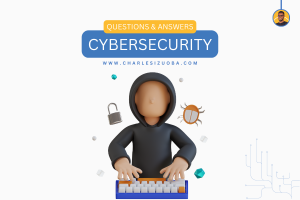Hello, Mr. Charles. Can I learn cybersecurity for personal use?
Yes, absolutely! But, first…
What is Cybersecurity?
Cybersecurity refers to the practice of protecting computer systems, networks, devices, and data from theft, damage, or unauthorized access.
It involves a range of measures and technologies designed to prevent, detect, and respond to cyber attacks, which may include malware infections, phishing scams, hacking attempts, or other forms of online threats.
The goal of cybersecurity is to ensure the confidentiality, integrity, and availability of digital assets, while also minimizing the risk of data breaches, identity theft, or other harmful consequences.
Learning cybersecurity for personal use can be a great way to protect your personal data, devices, and online identity from various security threats, such as hacking, phishing, malware, and other cyber-attacks.
There are many resources available online that can help you learn cybersecurity basics, such as cybersecurity blogs, online courses, videos, tutorials, and webinars. You can also find cybersecurity forums and online communities where you can ask questions, share your knowledge, and engage with other learners and experts.
Some of the key topics you may want to focus on when learning cybersecurity for personal use include…
- password management
- email security
- safe browsing habits
- anti-virus and anti-malware software
- two-factor authentication
- data encryption
- privacy protection
By learning about cybersecurity, you can not only protect your personal information and devices but also help create a safer and more secure online environment for everyone.
Here’s a brief overview of some of the key topics related to cybersecurity for personal use:
- Password Management:
This refers to the practice of creating strong, unique passwords and storing them securely. It also involves using different passwords for different accounts and changing them regularly to prevent unauthorized access.
- Email Security:
This involves taking measures to protect your email account from hacking, phishing, and other cyber-attacks. Some best practices include avoiding clicking on suspicious links or downloading attachments from unknown senders and enabling two-factor authentication for your email account.
- Safe Browsing Habits:
This includes using a secure web browser, avoiding downloading software or files from untrusted websites, and being cautious when clicking on pop-ups, ads, or links.
- Anti-virus and Anti-malware Software:
These are software programs that help detect, prevent, and remove malicious software, such as viruses, spyware, and ransomware.
- Two-Factor Authentication:
This is a security measure that involves using two forms of identification to access an account, such as a password and a code sent to your phone or email.
- Data Encryption:
This refers to the process of encoding data to protect it from unauthorized access. This can include encrypting files stored on your device, using secure messaging apps, and enabling encryption on your Wi-Fi network.
- Privacy Protection:
This involves taking steps to protect your personal information from being shared or accessed without your consent. This can include adjusting your privacy settings on social media platforms, being cautious about the personal information you share online, and using a virtual private network (VPN) to protect your internet connection.
In summary,
Learning about cybersecurity for personal use can be a valuable investment of time and effort, and can help protect your personal information and devices from various security threats.
By following best practices and staying informed about the latest trends and developments in cybersecurity, you can reduce your risk of becoming a victim of cybercrime and enjoy a safer and more secure online experience.
Remember, cybersecurity is an ongoing process, and staying vigilant and proactive is key to maintaining your online safety and privacy. Whether it’s adopting strong passwords, using anti-virus software, or staying up-to-date on the latest security threats and trends, every effort counts in safeguarding your personal information and devices.
So, click here to start learning about cybersecurity today through my quiz and take the necessary steps to protect yourself and your online presence. With the right knowledge and tools, you can enjoy the benefits of the internet while keeping your personal information and privacy secure.



